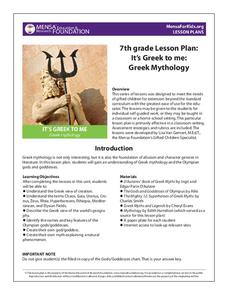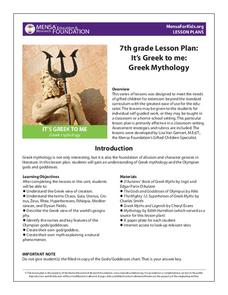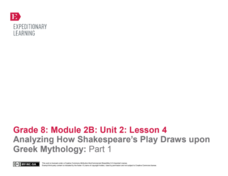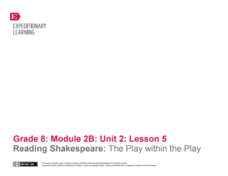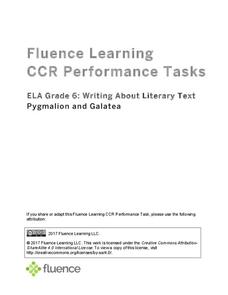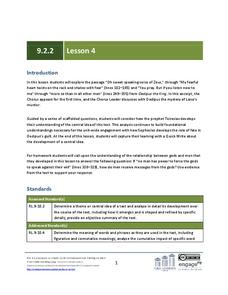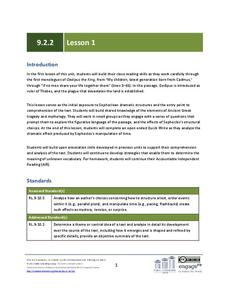MENSA Education & Research Foundation
It’s Greek to Me: Greek Mythology
It's no myth: this packet on Greek mythology is an excellent addition to your social studies curriculum. With writing activities, such as short answer responses and biopoems, and reading activities, which include creation stories and...
Jefferson Township Schools
Note Card Assignment for Greek Myth
Your young learners will keep track of fifteen Greek gods and goddesses, such as Aphrodite, Poseidon, and Zeus, by creating notecards listing each of their names, titles, and symbols.
MENSA Education & Research Foundation
It’s Greek to Me: Greek Mythology
Designed as extension exercises in homeschool or classroom settings, as well as for individual work, the ideas in this packet are sure to engage learners in an investigation of Greek mythology.
Curated OER
It’s Greek to Me: Greek Mythology
Here you'll find a great collection of worksheets to supplement your instruction of Greek mythology, including informational texts on the Olympian gods and goddesses, a matching quiz, graphic organizers, and myth-writing activities.
Curated OER
Myth Lesson Plans
What is the difference between myths, legends, and folktales? From greek mythology and creation myths to heroes and heroines, here is a nice series of lessons for providing your kids with solid foundational knowledge about myths.
Core Knowledge Foundation
Greek Myths Tell It Again!™ Read-Aloud Anthology
A unity covers Greek mythology through read-alouds and activities. Fourteen lessons share a new story that pupils discuss, then complete word work and extension opportunities. Topics include the gods of Mount Olympus, Hercules, and more.
Jefferson Township Schools
Major Greek Gods and Goddesses
From Poseidon (Neptune) to Aries (Mars) and Apollo, learners are given a great overview of the major Greek gods and goddesses with this resource, which includes a graphic organizer and reading excerpts on each of the gods.
EngageNY
Analyzing How Shakespeare’s Play Draws upon Greek Mythology: Part 2
Pupils explore the narrative structure of a piece of literary text, mapping out the plot structure of the Greek myth "Pyramus and Thisbe." Next, they use their completed graphic organizers to write story summaries.
Prestwick House
Edith Hamilton’s Mythology
Where is the Oracle? Who brought fire from Olympus? What creature is half bird, half horse? Review details from famous Greek myths with a crossword puzzle that focuses on Edith Hamilton's Mythology.
Have Fun Teaching
Compare and Contrast Greek Myths (4)
How are Icarus and Prometheus similar? How are they different? Compare any two Greek myths with a graphic organizer, which provides space for kids to fill in the ways that the myths are like and unlike each other.
EngageNY
Analyzing How Shakespeare’s Play Draws upon Greek Mythology: Part 1
Scholars read the story "Pyramus and Thisbe," analyzing word choice, tone, and meaning. They then try to find the gist of the story and discuss how Shakespeare used the myth in his play A Midsummer Night's Dream.
EngageNY
Analyzing How Shakespeare’s Play Draws upon Greek Mythology: Part 3
How do the narrative and play versions of the myth "Pyramus and Thisbe" affect meaning? Scholars reread Act 5, Scene 1 from Shakespeare's A Midsummer Night's Dream and compare its structure to "Pyramus and Thisbe." Next, they use a...
EngageNY
Reading Shakespeare: The Play within the Play
Scholars continue reading the Greek myth "Pyramus and Thisbe," analyzing why it was written into Shakespeare's A Midsummer Night's Dream. Next, they complete a Venn diagram to compare the two texts.
EngageNY
Reading Closely to Build Background Knowledge: “Myths and Legends”
That is a myth! Scholars take a look at Greek myths referenced in The Lightning Thief. As learners listen to stories in Myths and Legends, they imagine the sights and sounds described. Pupils then talk with partners about specific words...
Fluence Learning
Writing About Literary Text: Pygmalion and Galatea
Is it crazy to fall in love with your own work, or is that the purest love of all? Compare two renditions of the classic Greek myth Pygmalion and Galatea with a literary analysis exercise. After students compare the similarities and...
EngageNY
Connecting Literary and Informational Texts: Cronus and “The Key Elements of Mythology”
Is there a connection? Scholars work to make connections between Myth of Cronus and The Key Elements of Mythology. First, they circle important words in the text and look for similarities. They then revisit the concept of theme and...
EngageNY
Leaving the Play: All’s Well That Ends Well
How does Shakespeare develop the theme of control in A Midsummer Night's Dream? Using the resource, scholars analyze the theme of parental control in the play and the Greek myth "Pyramus and Thisbe." Next, they talk to partners to...
EngageNY
Mid-Unit Assessment: Author’s Craft: Analyzing Shakespeare’s Craft: Part 2
Annoyed or bewitched—how does an author's word choice affect a text? Scholars begin the instructional activity by analyzing word choice in Shakespeare's A Midsummer Night's Dream. Next, learners take a closer look at the narrative...
Reed Novel Studies
The Lightning Thief: Novel Study
Maybe dark clouds do have a silver lining. Just when Percy from The Lightning Thief thought of his life as doomed, he learned that his father is a Greek god. Scholars work through activities as they read how his life took a drastic turn....
EngageNY
Mid-Unit 2 Assessment: Analyzing Narrative Structure and Author’s Craft: Part 1
Using the resource, scholars complete a mid-unit assessment to gauge their learning at the halfway point of the unit. Pupils read the myth "The Harvest That Never Came" and plot its narrative structure.
Curated OER
The Lightning Thief: Vocabulary Strategy
Take an in-depth look into the vocabulary from the novel, Percy Jackson and the Olympians: The Lightning Thief by Rick Riordan. With a list of words to choose from, scholars discover the definition, origin, stories associated with the...
EngageNY
Grade 9 ELA Module 2, Unit 2, Lesson 4
The concept of sight, whether it's a lack of sight or abundant sight of the future, plays a vital role in Sophocle's Oedipus the King. Develop your ninth graders' literary vision with a lesson that connects the prophecy of Teiresias to...
EngageNY
Grade 9 ELA Module 2, Unit 2, Lesson 1
Delve into the heart of dramatic dialogue with a unit focused on Oedipus the King by Sophocles. Having completed an online exploration about ancient Greece beforehand, ninth graders read the play's opening lines and analyze how...
Prestwick House
Pygmalion
Mold the perfect review session with a crossword puzzle based on George Bernard Shaw's Pygmalion. As class members answer clues about Eliza Doolittle, Henry Higgins, and Colonel Pickering, they review key concepts from the play.
Other popular searches
- Greek Mythology Lesson Plans
- Greek Mythology Project
- Ancient Greek Mythology
- Greek Mythology Unit
- Book Making Greek Mythology
- Greek Mythology Heroes
- Greek Mythology Lessons
- Greek Mythology Art Lessons
- Greek Mythology and Music
- Greek Mythology Word Search
- "Ancient Greek Mythology
- Greek Mythology Art


